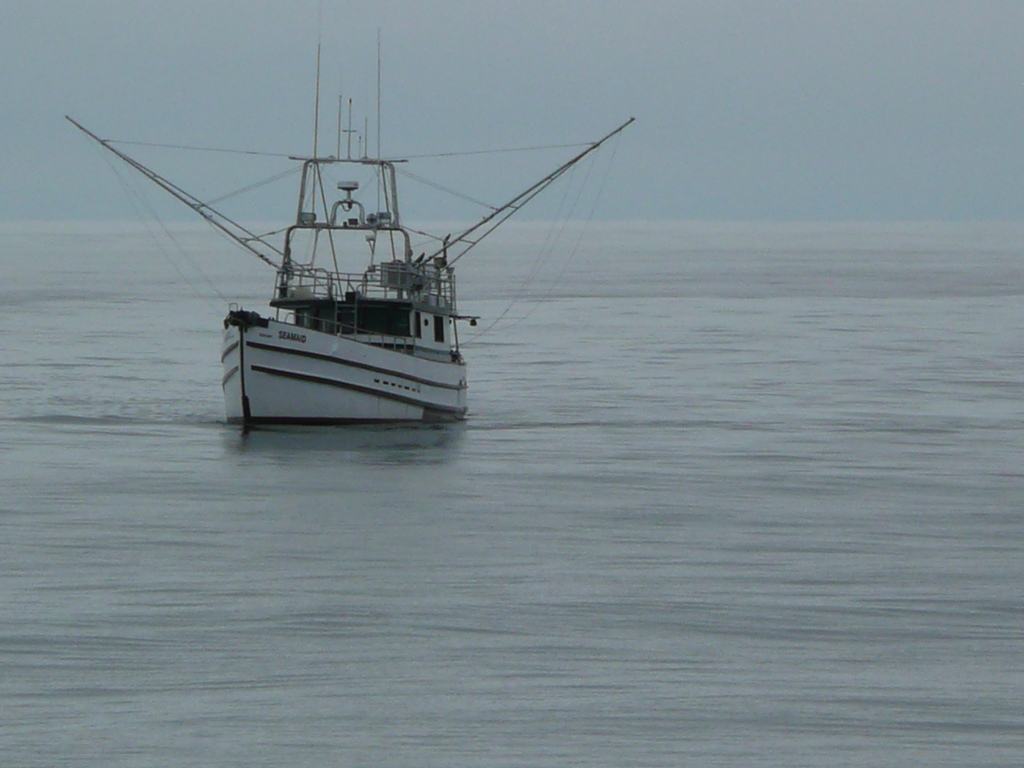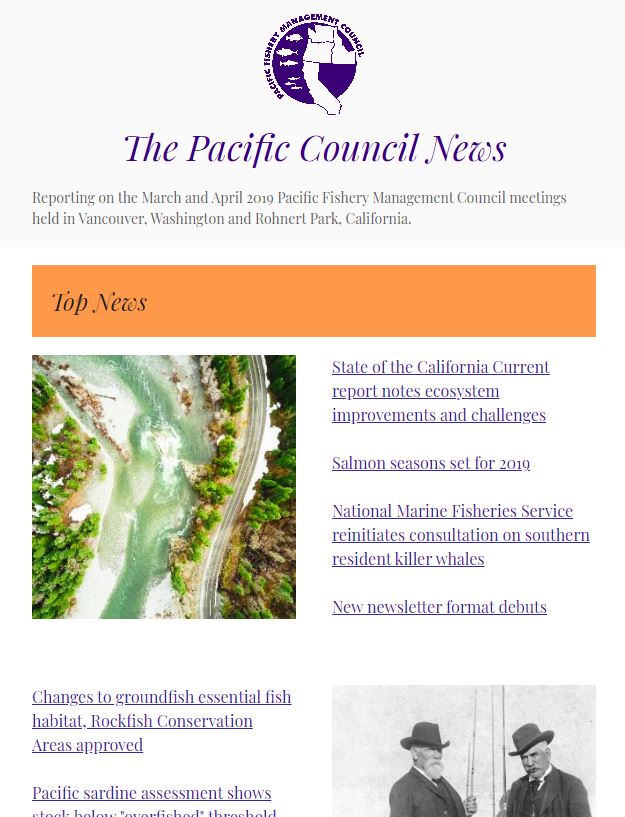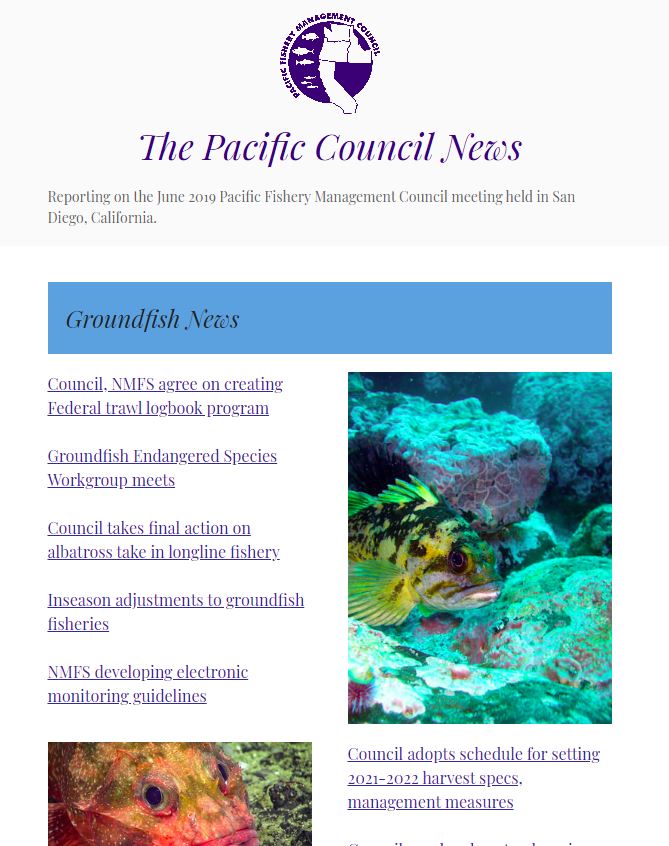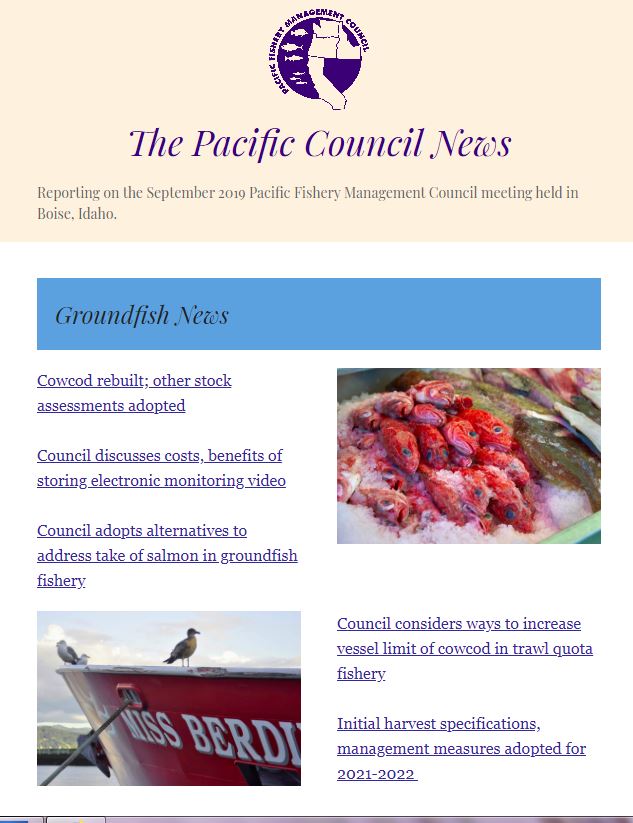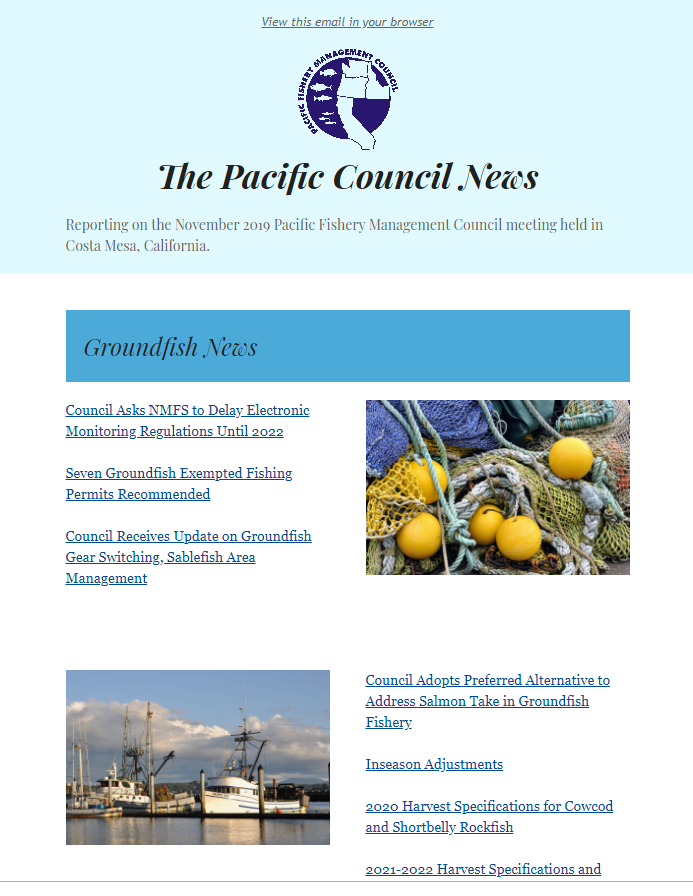Cowcod rebuilt; other stock assessments adopted
Cowcod has been rebuilt ahead of schedule, the Council announced in September. The cowcod (Sebastes levis) stock south of 40°10’ N. latitude was managed under a strict rebuilding plan that severely constrained West Coast fisheries in California for two decades. Rebuilding cowcod was achieved through large area closures, non-retention rules, and very low allowance for incidental bycatch. “This is a remarkable accomplishment,” said Council Chair Phil Anderson. “The Council’s perseverance, adherence to scientific advice, and partnering with the commercial and recreational stakeholders resulted in the rebuilding of this important groundfish species.”
Cowcod, prized by both California recreational and commercial fishermen, were declared overfished and placed under rebuilding measures in 2000. They are a long‐lived, slow‐growing species, prone to protracted rebuilding progress. Under the original rebuilding plan, the stock was expected to rebuild by 2090. Improved science and understanding of this stock’s population dynamics, coupled with favorable environmental conditions, allowed the Council’s management measures to rebuild the stock much quicker than originally anticipated.
The Council, National Marine Fisheries Service, and fishing industry stakeholders collaborated successfully to rebuild overfished West Coast groundfish stocks. Cowcod is the ninth West Coast groundfish stock to rebuild through stringent management measures, leaving yelloweye rockfish as the only Federally-managed groundfish stock managed under a rebuilding plan.
The cowcod assessment was developed by scientists at National Marine Fisheries Service Southwest Fisheries Science Center and was reviewed by a stock assessment review panel, which includes independent scientists, and endorsed by the Council’s Scientific and Statistical Committee. New harvest specifications and regulations informed by this assessment are expected to be put in place beginning in 2021.
Other assessments
The Council adopted the assessments, projections, and catch reports endorsed by the Scientific and Statistical Committee in September. For cabezon, the two California models and Oregon model all estimated depletion levels above the management target, with 2019 estimates of 49 percent (southern California), 65 percent (central/northern California) and 53 percent (Oregon). (A depletion level of 53 percent means that the stock is at 53 percent of its unfished biomass). Longnose skate had an estimated depletion of 57 percent in 2019. Big skate, which was assessed for the first time, was estimated to be at 79 percent depletion. Sablefish was estimated to be at 39 percent of “unfished spawning output” (or 39% of what the egg or larval production would be if the stock were unfished), but abundance is expected to increase, and the spawning output is projected to be above the target (40%) in 2021. The gopher/black-and-yellow rockfish complex was assessed for the first time as a complex. Spawning output has been decreasing since the mid-2000s, when the stock was estimated to be at 77 percent of the unfished level. It is now estimated at 44 percent. The petrale sole assessment was updated for the second time since 2013. Landings have increased in the last four years compared to the previous four years, consistent with the stock being rebuilt. For 2019, the depletion estimate is 39 percent; however, this is expected to decline, as recent recruitments have been below average. The 2015 widow rockfish assessment was updated; the stock is estimated to be at a depletion level of 92 percent. Finally, the yelloweye rockfish catch report stated that recent catches have all been below the 20 metric ton annual catch limit.
These assessments and projections of harvest specifications will inform management of the West Coast groundfish fishery in 2021 and beyond.
Council discusses costs, benefits of storing electronic monitoring video
Electronic monitoring was a hot topic at the September Council meeting, when the Council discussed the costs and benefits of storing video collected as part of the electronic monitoring program for various lengths of time, as well as the management, scientific, and enforcement needs of electronic monitoring programs around the country.
The Council heard public testimony about the cost of the third party review of video and asked NMFS and the Council for more detailed information about how the program will be set up and managed by NMFS. Specifically, the industry requested review of a NMFS electronic monitoring manual that describes at what level providers will need to conduct video review (e.g., 100% or 50%), how long to store data, how to transfer data to NMFS, and other items that will help providers and participants refine cost estimates for participating in the program.
The Council recommended that NMFS consider the changes identified by the Groundfish Electronic Monitoring Policy Advisory Committee in their report on program guidelines and storage procedures. The Council plans to review revised program guidelines and a manual and further discuss the program at their November meeting.
The Council sent a letter to the Pacific States Marine Fisheries Commission asking the Commission to help them find a path forward that would allow the Commission to continue providing video review services for the industry in the future.
Council adopts alternatives to address take of salmon in groundfish fishery
In September the Council adopted preliminary preferred alternatives to address the 2017 National Marine Fisheries Service (NMFS) biological opinion (BiOp) on take of salmon in the Pacific Coast groundfish fishery.
The BiOp focuses on the impact of the groundfish fishery on seven listed Chinook and coho salmon evolutionary significant units. It included multiple measures (called Terms and Conditions) that the Council and/or NMFS must develop and implement within three years to avoid reinitiation of the Endangered Species Act Section 7 consultation.
Some measures were addressed during the 2019-2020 groundfish biennial specifications process, but two required Council action in September.
The first measure required the Council to develop and implement salmon bycatch mitigation measures for the groundfish fishery, as necessary. These measures can be implemented inseason to reduce the risk of a sector exceeding its bycatch guideline.
The other measure required the Council to develop a process to allow a fishery sector access to a “reserve” of 3,500 Chinook salmon. This reserve is to be accessed only when a sector exceeds, or is projected to exceed, its bycatch guideline.
Both of these conditions provide a way for the Council to reduce incidental salmon bycatch and keep the fishery operational.
Currently, a total take of 20,000 Chinook and 1,034 coho are allowed for the entire groundfish fishery. The BiOp set specific bycatch limits of each species for the whiting and non-whiting groundfish sectors.
The BiOp apportioned Chinook into three parts: the whiting sector, the non-whiting sector, and the “reserve.” The bycatch guideline for the whiting and non-whiting sectors are 11,000 and 5,500 Chinook, respectively, with a “reserve” of 3,500 Chinook. If a fishery exceeds its bycatch guideline it can access the reserve Chinook. If the fishery exceeds its bycatch guideline and takes all the reserve, it will close. The entire fishery closes at 20,000 Chinook.
Coho amounts for whiting and non-whiting are 474 and 560, respectively. Unlike Chinook, exceeding the limit for coho will not close a fishery, but it would reinitiate Endangered Species Act Section 7 consultation.
The preliminary preferred alternatives selected by the Council to address these two measures are as follows:
- Block area closures (BACs): Consider developing BACs for the whiting sector and non-whiting midwater trawl fisheries as a routine inseason mitigation measure. BACs are area closures based on depth contours and latitude lines, and can be set for a specific time period. (Alternative 1)
- Extension of block area closure for all trawl gears to the western boundary of the exclusive economic zone (EEZ): Develop regulations to allow for the extension of any block area closure seaward of 250 fathoms south of 46⁰16’00” N. latitude (WA/OR border) for all trawl gears to the western boundary of the EEZ (for midwater trawl) or to the 700 fathom Essential Fish Habitat Conservation Area closure (for bottom trawl). In current regulation, BACs can only be set to 250 fm. A reason Alternative 1 was selected is it would allow the Council to address any salmon bycatch beyond the 250 fm depth contour. (Alternative 1)
- Selective flatfish trawl net requirement: Consider the requirement of selective flatfish trawl net gear as a routine inseason mitigation measure for bottom trawl vessels operating in areas of high salmonid bycatch or, potentially, in conjunction with a BAC, to reduce incidental take of salmon. (Alternative 1)
- Pacific Whiting Cooperative Operational Rules: Allow each whiting sector co-op to develop salmon mitigation plans for approval by NMFS. Require annual season summary reporting to the Council and NMFS describing high-salmon bycatch incident information and avoidance measures taken. (Alternative 2)
- Automatic authority for NMFS to close trawl sectors and preserve 500 Chinook salmon for fixed gear and recreational fisheries: Consider adjusting the total Chinook salmon closure points for the whiting and non-whiting trawl sectors that would preserve 500 Chinook salmon for the fixed gear and recreational fishery. (Alternative 1)
- Development of Reserve rule provision: A sector may only access the Reserve if the Council or NMFS has taken action to minimize Chinook salmon bycatch in that sector prior to it reaching its Chinook salmon bycatch guideline. (Alternative 1)
For the at-sea whiting sector, the requirement for Council or NMFS action to minimize Chinook salmon bycatch for access to the Reserve would be satisfied upon approval by NMFS of each of those sector’s respective co-op salmon mitigation plans.
For the shoreside whiting sector, the requirement for Council or NMFS action to minimize Chinook salmon bycatch for access to the Reserve would be satisfied upon approval by NMFS of that sector’s co-op salmon mitigation plans, provided all participating vessels are members of a shoreside co-op with an approved salmon mitigation plan.
If there are vessels participating in the shoreside whiting fishery that are not members of a shoreside whiting co-op, then additional actions by the Council or NMFS may be needed to minimize Chinook salmon bycatch (e.g., BACs, SFFT) prior to allowing access to the reserve by that sector.
Final action on this agenda item is scheduled for November 2019.
Council considers ways to increase vessel limit of cowcod in trawl quota fishery, annual catch limit of shortbelly rockfish
In September the Council considered increasing the 2020 annual catch limit for shortbelly rockfish to avoid the need to prematurely close fisheries due to high bycatch next year. The Council also considered eliminating the 2020 annual catch target and reducing the yield set-aside for cowcod south of 40°10’ N. lat. in order to increase the annual vessel limit of cowcod in the trawl individual fishing quota fishery.
The Council had received public comment from stakeholders in June requesting relief for both of these issues. Affected trawl participants south of 40°10’ N. lat. asked for a higher annual vessel limit of cowcod, since it is difficult to avoid incidental catch of cowcod as the stock rebuilds. They were concerned the fishery would be disrupted if the annual vessel limit was attained prematurely. In June, the Groundfish Management Team and Groundfish Advisory Subpanel recommended increasing or eliminating the 2020 cowcod annual catch target (ACT) to avoid a disruption of the fishery.
Public comment also addressed an unexpected increase in the bycatch of shortbelly rockfish in the Pacific whiting fishery this year. Shortbelly rockfish rarely occur north of 40°10’ N. lat., but an apparent distributional shift has greatly increased encounters with them in northern midwater trawl fisheries. Because of the stock’s importance as a forage species, the 2020 shortbelly rockfish annual catch limit of 500 mt was set intentionally low compared to the acceptable biological catch of 5,789 mt. Commenters requested an increase in the 2020 annual catch limit (ACL) to avoid fishery disruptions if the bycatch is high again next year.
The Council adopted a range of 2020 shortbelly rockfish ACLs varying from the status quo (500 mts) to 4,184 mt, which is equal to the 2021 and 2022 acceptable biological catch of shortbelly rockfish. The Council’s preliminary preferred alternative for a 2020 shortbelly rockfish ACL is 3,000 mt, as recommended by the Groundfish Advisory Subpanel.
The Council also adopted an alternative to the status quo ACT of 6 mt for cowcod south of 40°10’ N. lat., which would eliminate the ACT. The three options for adjusting the yield set-aside range from no adjustment to the specified set-aside of 2 mt to a 75 percent reduction of the set-aside (0.5 mt). The Council’s preliminary preferred alternative for this action is to eliminate the ACT and reduce the set-aside by 50 percent (1 mt). This action would increase the 2020 annual cowcod vessel limit from 858 lbs. to 1,264 lbs. None of the alternatives would change the cowcod ACL.
The Council is scheduled to take final action for both of these initiatives at their November meeting in Costa Mesa, California.
Initial harvest specifications, management measures adopted for 2021-2022
In September the Council adopted 2021 and 2022 groundfish harvest specifications endorsed by the Scientific and Statistical Committee. The Council also recommended exploring alternative harvest control rules and resulting harvest specifications for cowcod south of 40°10’ N. lat., petrale sole, sablefish, shortbelly rockfish, and Oregon black rockfish.
The Council asked for further public comment on new management measures recommended by the California Department of Fish and Wildlife, Groundfish Management Team, and Groundfish Advisory Subpanel.
The Council will consider a range of alternative harvest control rules and new management measures for detailed analysis at their November meeting in Costa Mesa, California. The Council is scheduled to recommend final 2021 and 2022 groundfish harvest specifications at their April 2020 meeting in Vancouver, Washington, and final management measures at their June 2020 meeting in San Diego, California. This sequence of decision-making is scheduled so that the new regulations can be implemented on January 1, 2021.
Inseason adjustments to groundfish fisheries
The Council adopted new sablefish daily trip limits as follows:
- Open access north: 300 lb/day, or one landing per week up to 1,500 lb, not to exceed 3,000 lbs/ 2 months
- Limited entry north: 1,700 lb/week, not to exceed 5,100 lb/ 2 months
The Council also recommended that NMFS extend the midwater trawl and electronic monitoring exempted fishing permits (EFPs) through 2020. The midwater trawl EFP is designed to collect information about Chinook and coho salmon in the areas south of 42° N. latitude. This information is needed in order for the Council to consider expanding non-whiting midwater trawl into areas and times of year that are not currently available to these vessels. The Council also examined the status of electronic monitoring EFPs and encouraged NMFS to consider improvements, as described in the GEMPAC report, to this EFP. The EFP is needed to provide vessels, electronic monitoring providers, and NMFS time to transition out of an EFP and into electronic monitoring program regulations that will become effective on January 1, 2021.
Groundfish methodology review topics chosen
The Council adopted methodology review topics recommended by the Scientific and Statistical Committee for formal methodology reviews next year. These topics include: 1) a combined visual-hydroacoustic survey of Oregon’s nearshore semi-pelagic black, blue, and deacon rockfish; 2) a review of data-moderate approaches that are highly reliant on length data; and 3) a meta-analysis of productivity estimates for elasmobranchs. These methodologies will be reviewed next year and may inform future groundfish stock assessments and management decisions if endorsed.

